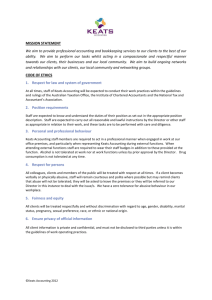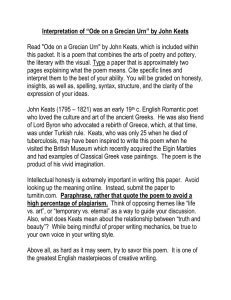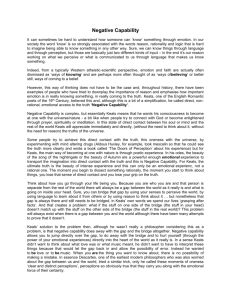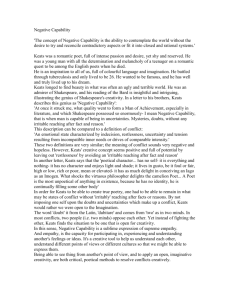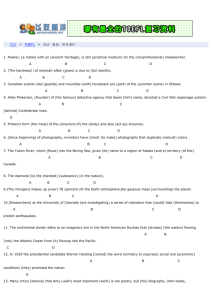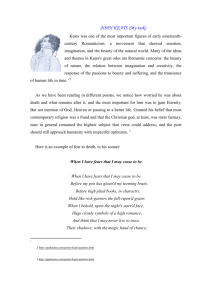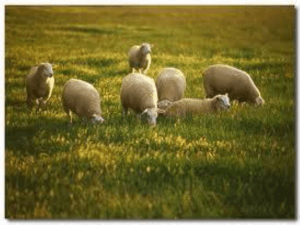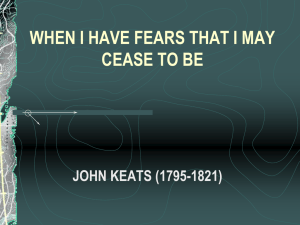goodpoetrypaper2
advertisement
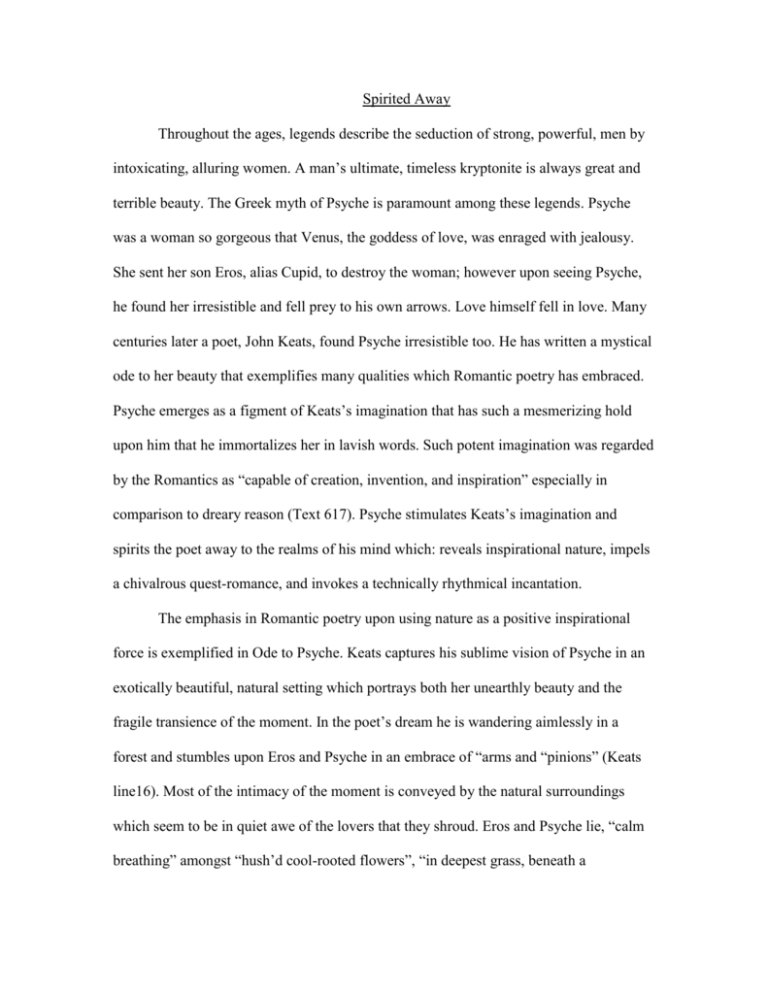
Spirited Away Throughout the ages, legends describe the seduction of strong, powerful, men by intoxicating, alluring women. A man’s ultimate, timeless kryptonite is always great and terrible beauty. The Greek myth of Psyche is paramount among these legends. Psyche was a woman so gorgeous that Venus, the goddess of love, was enraged with jealousy. She sent her son Eros, alias Cupid, to destroy the woman; however upon seeing Psyche, he found her irresistible and fell prey to his own arrows. Love himself fell in love. Many centuries later a poet, John Keats, found Psyche irresistible too. He has written a mystical ode to her beauty that exemplifies many qualities which Romantic poetry has embraced. Psyche emerges as a figment of Keats’s imagination that has such a mesmerizing hold upon him that he immortalizes her in lavish words. Such potent imagination was regarded by the Romantics as “capable of creation, invention, and inspiration” especially in comparison to dreary reason (Text 617). Psyche stimulates Keats’s imagination and spirits the poet away to the realms of his mind which: reveals inspirational nature, impels a chivalrous quest-romance, and invokes a technically rhythmical incantation. The emphasis in Romantic poetry upon using nature as a positive inspirational force is exemplified in Ode to Psyche. Keats captures his sublime vision of Psyche in an exotically beautiful, natural setting which portrays both her unearthly beauty and the fragile transience of the moment. In the poet’s dream he is wandering aimlessly in a forest and stumbles upon Eros and Psyche in an embrace of “arms and “pinions” (Keats line16). Most of the intimacy of the moment is conveyed by the natural surroundings which seem to be in quiet awe of the lovers that they shroud. Eros and Psyche lie, “calm breathing” amongst “hush’d cool-rooted flowers”, “in deepest grass, beneath a whispering roof…of leaves” (Keats 13 & 15). The couple seems to be one with nature, all of which is frozen in a timeless embrace between passionate, erotic, kisses; their kissing “lips touch’d not, but had not bade adieu” (Keats 17). Even the time of the encounter, dawn, contributes to the mood of suspended animation because it is between day and night. Belying the cool, calm, imagery is the tension of trembling nature holding its breath to fight off sunrise just a moment longer. Keats also shares the fundamental Romantic belief that nature is the source of ultimate truth and beauty; so in order to fathom Psyche’s beauty he compares her to the night sky. He lauds her as “fairer than Phoebe’s sapphire-region’d star” which is the moon (Keats 26). If that description was not dazzling enough, the poet then tops it himself by claiming she is more beautiful than “Vesper, amorous glow-worm of the sky” which is the planet Venus (Keats 27). Keats’s praise of Psyche transcends the stratosphere, for nothing on earth is fair enough to compare her to, and instead he seeks her equal in the vaults of the heavens. Nature features strongly at the resolution of the poem as an enthused Keats evokes a fantastical landscape within his imagination dedicated to the worship of Psyche. This parallels the Romantic perception of a connection between the divine “creative force that resides in man and nature” (Text 612). The shrine takes on mythical proportions as Keats conjures a vast mountain covered with “branched thoughts” (Keats 52). Despite its epic proportion, the mountain is still intimate because the poet describes a “rosy sanctuary” with unique flowers and unnamed stars just for Psyche (Keats 59). Keats’s imagination is so fired by his natural vision of Psyche that he is impelled upon a chivalrous quest romance, (a medieval literary form adopted by the Romantic poets.) The quest-romance was essentially a knight’s crusade through foreign lands in pursuit of the ideal woman. First, Keats is inspired by the myth of the ultimate idealized woman, Psyche, who was so beautiful that Love fell in love with her. She serves as his muse and the object of his adulation. Her presence is so exhilarating that it ferments his imagination. Also in keeping with the elements of the quest romance, Keats himself becomes her champion. He vows to rescue Psyche from relative obscurity. Although her “lucent fans” are barely “fluttering among the faint Olympians” who die away from lack of worship, Keats restores her to her full, blazing, glory through the beauty and force of his poetry (Keats 41-42). He also dedicates “an untrodden”, ardent, “region” of his mind to her (Keats 51). Lastly, the lure of the quest romance for Romantic poets reflected their disenchantment with formal religion and instead an eclectic preference for combining Greco-Roman myths with religion and even sexual imagery. This almost heretical freedom of expression is exuberantly and feverishly emphasized by the way Keats describes Psyche’s lack of Christian “alter” and “incense” and pagan “lute” (Keats 29 & 32). The poet declares provocatively that Psyche misses the “heat of pale-mouth’d prophet” (Keats 34-35) which invoke sexual images. He also describes her distinct lack of a “virgin-choir to make delicious moan/upon midnight hours” (Keats 30).Virgins, choirs, and moaning are all mixed to create a sensuous, arduous, yet sacred aura. Psyche inspires Keats and fuels his sense of chivalry. He embraces the role of champion which has egotistical, spiritual, and erotic appeal. The use of repetition, alliteration and assonance contribute to the rhythm of the poem which gives it a dreamlike, musical cadence; this mystical quality adds to the sense that Keats is delving into his spiritual, imaginative self. In the first stanza of the poem, alliteration is used to help invoke Psyche. Keats beseeches his muse to “pardon that thy secrets should be sung/Even into thine own soft-conch’d ear/sureley I dreamt…or did I see/…on the sudden, fainting with surprise/…in deepest grass beneath a whisp’ring roof” (Keats 3-10). Keats repeats his s’s so that it sounds as if he is intimately whispering into some deity’s ears. The poet’s “tuneless number” continues in stanza two with a change in rhythm; assonance is employed as a tool to help slow down time (Keats 1). Eros and Psyche are described as lounging in “cool rooted flowers” (Keats 13). The lengthiness of the vowel sounds in the line emphasizes the sense that all life is paused and calm. Likewise the long vowel sounds in the phrase “calm breathing on bedded grass” (Keats 15) literally have the effect of creating a slow, soporific mood. Repetition in stanzas three and four create a mood reminiscent of a religious incantation. In stanza three, Keats seems to chant “No voice, no lute, no pipe, no incense sweet/from chain swung censer teeming/ no shrine, no grove, no oracle no heat/ Of pale-mouth’d prophet dreaming” (Keats 32-35). Then, when he repeats that section with thy’s in place of the no’s, it creates an effect reminiscent of religious fervor while affirming the poet’s ardent mindset. Keats creates a mystical song to a Grecian goddess that enhances the aura of the poem and helps him achieve his imaginary ends. John Keats embraces his vision of Psyche in nature and its hold on his fertile imagination. He exalts her in a lyrical, joyous, reverie by adopting some of the elements of a quest romance and by freely mingling religious and mythological elements. Even the technicalities of his poem, such as repetition, assonance, and alliteration, add mystique to the poem’s atmosphere. Keats’s masterpiece has forever immortalized not only the beauty of Psyche, but also some of the ideals of the Romantic writers. Works Cited Mitchell, W.J. Thomas. “The Romantic Period.” The Literature of England. United States of America: Third Single Volume Edition. Harpers Collins Publishers, 1979. Keats, John. “Ode to Psyche.” The Literature of England. United States of America: Third Single Volume Edition. Harpers Collins Publishers, 1979.
